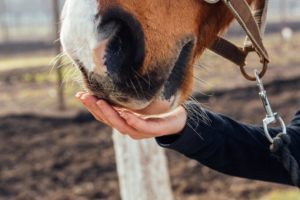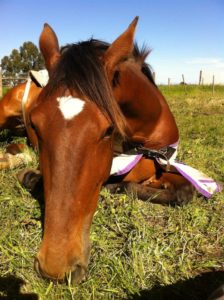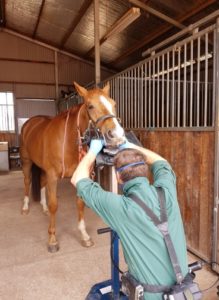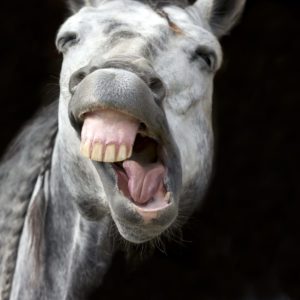
The most trusted and valuable equine members of our families are senior horses. Those that have been with us through the good times and bad. Whilst they may not be able to compete or train they offer companionship for both horse and humans. With age, changing nutritional requirements and dental issues, senior horses often have difficulty in maintaining body weight and condition. Keeping this in mind it is imperative that we prepare our senior friends for the upcoming cold weather experienced during winter.
Nutrition plays a large role in the overall health of our senior friends. Nutritional requirements change and senior horses require good quality fibre (hay/ chaff) and a high protein, high fat diet. As many horse owners know, hay is often a mainstay of all horses winter diets. This is due to the pasture of the paddocks, which house our equine friends, ceasing to grow and turning an unappetizing shade of brown. When this occurs supplementation of the horses roughage through the regular feeding of good quality hay can help to obtain the nutritional requirements for those maintained on pasture. Now is the time to stockpile hay that your horses will require in the winter months. As many feed stores and farmers run out of hay stores, it can make supply both difficult to find and expensive. In looking at hay to purchase it is important to look at the quality of the bales. Features that are common to all high quality hay include; a soft texture with an abundance of leaves, free from debris such as twigs or weeds, that is aromatic without even the slightest hint of mould or mildew and an appealing green tinge to the bales. It may be useful for those looking to purchase hay to look at the inside of a bale or two to ensure the quality.
 In choosing and feeding hay it is important to consider the management system in place at the property. Does the horse get checked and feed once or twice a day, are there multiple horses in the paddock? Will the horses be fed biscuits of hay or maintained on a round bale? These are all important things to consider when purchasing hay. Whilst large round bales are less labour intensive, feeding a biscuit of hay once or twice a day enables interaction and evaluation of your four hooved friend. Making it possible for you to detect the sudden onset of lameness or an unusual cough. By feeding individual biscuits, the quality of hay can be monitored throughout the winter months, ensuring the quality and quantity of hay is maintained. When feeding multiple horses within a paddock separating the piles of hay ensures meeker horses will have a chance to eat their quota of hay, without the fear of being chased off by more dominant horses, as can be the case with round bales. If, however, round bales are found to be the most cost and time efficient method of feeding hay, then it must still follow the guidelines for hay quality and be made for horses. Minimising wastage of round bales is important to ensure quality, providing a purpose made hay rack for horses, shelter for the round bale from the elements and ensuring the base of the bale is off the ground are all ways that may help in reducing the waste experience when feeding a round bale.
In choosing and feeding hay it is important to consider the management system in place at the property. Does the horse get checked and feed once or twice a day, are there multiple horses in the paddock? Will the horses be fed biscuits of hay or maintained on a round bale? These are all important things to consider when purchasing hay. Whilst large round bales are less labour intensive, feeding a biscuit of hay once or twice a day enables interaction and evaluation of your four hooved friend. Making it possible for you to detect the sudden onset of lameness or an unusual cough. By feeding individual biscuits, the quality of hay can be monitored throughout the winter months, ensuring the quality and quantity of hay is maintained. When feeding multiple horses within a paddock separating the piles of hay ensures meeker horses will have a chance to eat their quota of hay, without the fear of being chased off by more dominant horses, as can be the case with round bales. If, however, round bales are found to be the most cost and time efficient method of feeding hay, then it must still follow the guidelines for hay quality and be made for horses. Minimising wastage of round bales is important to ensure quality, providing a purpose made hay rack for horses, shelter for the round bale from the elements and ensuring the base of the bale is off the ground are all ways that may help in reducing the waste experience when feeding a round bale.
 With physical changes to their teeth senior horses take longer to eat compared to their junior counterparts and may find it difficult to grind grains and roughage effectively. Manufactured senior feeds have been developed to include steam extruded grains which are easier for horses to effectively digest. Horses that are finding it hard to chew may benefit from pellets being made into a mash by adding warm water and/ or molasses. Supplements such as B complex vitamins and Omega 3-6 oils are also beneficial, for senior horses health and well being.
With physical changes to their teeth senior horses take longer to eat compared to their junior counterparts and may find it difficult to grind grains and roughage effectively. Manufactured senior feeds have been developed to include steam extruded grains which are easier for horses to effectively digest. Horses that are finding it hard to chew may benefit from pellets being made into a mash by adding warm water and/ or molasses. Supplements such as B complex vitamins and Omega 3-6 oils are also beneficial, for senior horses health and well being.
During the colder months all horses rely on body condition to maintain warmth. Shelter is imperative to provide a break from the wind and rain, reducing the need for senior horses to produce their own heat to stay warm. To aid the senior horse in maintaining their condition a good quality, warm, waterproof rug will keep you senior friend comfortable. It is important to remove these rugs regularly in order to monitor body condition, check the horses coat and make sure the rug is not rubbing (especially in the wither area).
A horse’s immune system deteriorates with age, resulting in the senior horse being more susceptible to parasites and illnesses. As such, an increased worm burden can occur. By using faecal egg counts (FEC) to determine the worm burden of individuals, a tailored deworming program is able to be developed to ensure the senior horse has a minimal worm burden. By using FEC, deworming products are used only when high enough worm burdens are present and resistance to deworming products can be minimised. Annual vaccinations such strangles and tetanus, can also assist in boosting the immune system of the senior horse against strangles and tetanus. Health is also affected by horses teeth. Unlike us, horses teeth continually grow down throughout their lives. This continual growth is counter balanced by continual grinding as the horse chews and grinds its food. As horses move beyond their 20’s the rate of growth slows but the grinding needs to continue. Some teeth maybe lost and the front incisor teeth become more elongated. These changes result in senior horses finding it more difficult to eat roughage and gain nutrients from their feed, but also run the risk of choke and impaction colic from swallowing an improperly chewed food. For this reason it is a great idea to have older horses teeth checked at least annually, prior to the onset of winter.
Management of the property ensures access during the winter months and prevents the deterioration of the pasture. During winter, pastures undergo a number of freeze thaw cycles, that can result in the accumulation of mud at access points and along fence lines where senior horses may congregate. To avoid deterioration along fence lines and at gates, feeders should be spaced generously throughout the field, away from gates, waterers and fence lines. By moving these tubs frequently, these are areas will not become barren and susceptible to become a mud patch. By placing feed containers apart, meeker horses will be less likely to be picked on by dominant horses. Feeding hay over bare patches can assist with seed distribution and result in these winter bare patches become spring grass patches. However, it is still important to ensure these bare patches don’t end up becoming winter bog patches from over use.
By preparing for the cold weather you will ensure that your senior four-hooved friend can make it through the winter months in good condition free from illness. The vets and trained support staff at Gisborne Veterinary Clinic are always available to answer any questions you have regarding the care of your senior horse.





